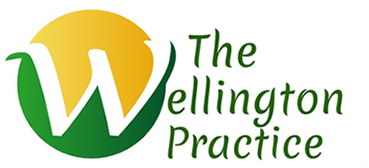Philip Owen-Halley
Microsoft Outage – Back to Normal Monday 22/7/24
Systems are back to normal following the Microsoft outage of last Friday although there are a number of appointments and prescriptions that need to be cleared in addition to those requesting new ones so please do bear with us whilst we clear the backlog. Hopefully our increased staffing levels will allow for back to normal from tomorrow.
Thank you for your support
National Microsoft Outage Update Saturday 20/7/24
The national Microsoft outage is still affecting the practice after testing today (Sat 20/7). Please only call us on Monday if urgent care is needed and it cannot be dealt with by NHS111. Prescriptions still cannot be issued whilst systems are not functioning. We will issue a further update as soon as we can through posting news bulletins on our website so please do check. https://bit.ly/3LyAu26 for updates and our facebook page
Global IT outage Friday 19/7/24
The NHS, including GP practices across England, is experiencing an issue with GP appointment and patient record systems due to a global IT outage. This means we currently have no access to medical records, prescribing or any functionality required to do our normal business.
Please note that we remain open and are seeing patients with existing appointments and those needing emergency same day appointments. We have enacted our business continuity plan to ensure we continue to provide services for our patients.
If you need urgent help or advice, we urge patients to use NHS 111 online (https://111.nhs.uk/) or call 111.
Our GP practice phone lines remain open should you require to contact us direct. Please bear with us during this difficult time and we apologise for any inconvenience this may cause.
Carers UK Survey
Carers UK have launched their State of Caring survey 2024, would you kindly share the link below with all carers you come into contact with. It takes about 10-15 mins to complete.
Measles update
A number of new cases have been nationally reported although in single figures so the potential will most likely to be to see more cases occurring. If you are not sure, please call for a telephone appointment and do not come to the surgery until you have spoken with the GP. We need to manage the risk of measles spreading and the more we control our processes the greater our risk reduction will be.
Measles
Measles is an infection that spreads very easily and can cause serious problems in some people. Having the MMR vaccine is the best way to prevent it.
Check if you or your child has measles
Measles usually starts with cold-like symptoms, followed by a rash a few days later. Some people may also get small spots in their mouth.
Cold-like symptoms
The first symptoms of measles include:
-
-
- a high temperature
- a runny or blocked nose
- sneezing
- a cough
- red, sore, watery eyes
-
Spots in the mouth
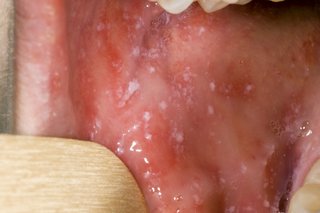
Small white spots may appear inside the cheeks and on the back of the lips a few days later. These spots usually last a few days.
The measles rash
A rash usually appears a few days after the cold-like symptoms.
The rash starts on the face and behind the ears before spreading to the rest of the body.
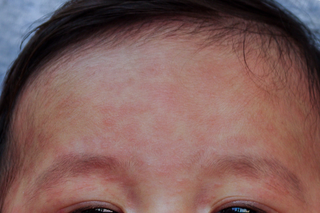
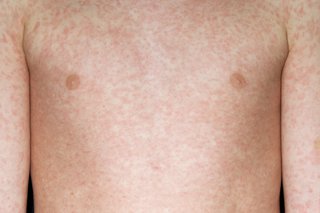
The spots of the measles rash are sometimes raised and join together to form blotchy patches. They’re not usually itchy.
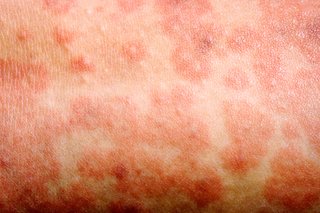
The rash looks brown or red on white skin. It may be harder to see on brown and black skin.
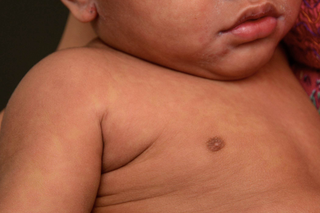
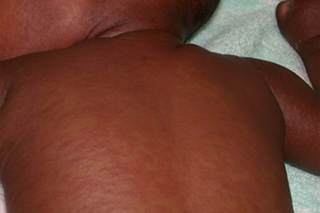
If you’re not sure it’s measles
It’s very unlikely to be measles if you’ve had both doses of the MMR vaccine or you’ve had measles before.
Urgent advice: Ask for an urgent GP telephone appointment or get help from NHS 111 if:
-
-
- you think you or your child may have measles
- your child is under 1 year old and has come into contact with someone who has measles
- you’ve been in close contact with someone who has measles and you’re pregnant or have a weakened immune system
- you or your child have a high temperature that has not come down after taking paracetamol or ibuprofen
- you or your child have difficulty breathing – you may feel more short of breath than usual
- your baby or young child is not feeding well, or taking less feeds or fluids than usual
- you or your child are peeing less than usual (or your baby has fewer wet nappies)
- you or your child feels very unwell, or you’re worried something is seriously wrong
-
Measles can spread to others easily. Call your GP surgery before you go in. They may suggest talking over the phone.
You can also call 111 or get help from 111 online.
How to look after yourself or your child
Measles usually starts to get better in about a week.
After seeing a GP, there are things you can do to help ease the symptoms and reduce the risk of spreading the infection.
It can help to:
-
-
- rest and drink plenty fluids, such as water, to avoid dehydration
- take paracetamol or ibuprofen for a high temperature
- give your child paracetamol or ibuprofen if they’re distressed or uncomfortable – check the packaging or leaflet to make sure the medicine is suitable for your child, or speak to a pharmacist or GP if you’re not sure
- use cotton wool soaked in warm water to gently remove any crusts from your or your child’s eyes
-
Important
Stay off nursery, school or work for at least 4 days from when the rash first appears.
Also try to avoid close contact with babies and anyone who is pregnant or has a weakened immune system.
How to avoid spreading or catching measles
Measles is spread when an infected person breathes, coughs or sneezes.
You’re infectious from when you first have symptoms (around 4 days before the rash appears) until 4 days after you get the rash.
There are things you can do to reduce the risk of spreading or catching measles.
Do
-
-
-
wash your hands often with soap and warm water
-
use tissues when you cough or sneeze
-
throw used tissues in the bin
-
-
Don’t
-
-
-
do not share cutlery, cups, towels, clothes, or bedding
-
-
Complications of measles
Measles can lead to serious problems if it spreads to other parts of the body, such as the lungs or brain.
Problems that can be caused by measles include:
-
-
- pneumonia
- meningitis
- blindness
- seizures (fits)
-
These problems are rare, but some people are more at risk. This includes babies and people with weakened immune systems.
Measles in pregnancy
If you get measles when you’re pregnant, it could harm your baby.
It can cause:
-
-
- miscarriage or stillbirth
- premature birth (before the 37th week of pregnancy)
- your baby having a low birthweight
-
It’s important to get medical advice if you’re pregnant and have been in close contact with someone who has measles.
Immediate action required:Call 999 or go to A&E if:
You or your child has measles and:
-
-
- have a seizure (fit)
- severe difficulty breathing – you’re gasping, choking or not able to get words out (babies may make grunting noises or their stomach may suck under their ribcage)
- are unable to stay awake – cannot keep their eyes open for more than a few seconds
- suddenly become confused – your child may be very unsettled, behaving differently, or crying non-stop
- your child is limp, floppy or not responding normally – their head may fall to the side, backwards or forwards, or they may find it difficult to lift their head and focus on your face
- a rash that does not fade when you press a glass against it
- a stiff neck, or find light uncomfortable or painful
-
Do not drive to A&E. Ask someone to drive you or call 999 and ask for an ambulance.
Bring any medicines you take with you.
Get vaccinated against measles
The MMR vaccine can prevent measles. It also protects you from mumps and rubella.
The MMR vaccine is offered to all children in the UK. 2 doses can give lifelong protection against measles, mumps, and rubella.
Ask at your GP surgery if you’re not sure you or your child have had the vaccine. They can give it for free on the NHS.
MEASLES
Please see the PDF information leaflet in the viewer below. To view the original accessible PDF in a new browser window, please click here.
Practice Shut for Training afternoon 27 June 2024
Cares Week 10/6/24
The Wellington Practice transferred into new reception area ready for Monday opening 20th May 2024. We literally have moved left
The Wellington Practice transferred into new reception area ready for Monday opening 20th May 2024. We literally have moved left so as you usually approach us we are now left a bit. Probably easier as you come into the main Aldershot centre atrium to walk left of the big hanging artwork and make your way round the left and approach us from the garrison practice side. It is a larger front desk so more room to be able to manage patient queries. It won’t be long before our automatic patient check in monitor will be running however we are having NHS IT issues getting it sorted. We hope this will be an improvement on the much smaller reception we had for so many years.
Practice Closed for Training Tuesday 14 May 2024 pm
Diabetic Eye Screening Portal for Results Viewing
Patients will now be able to book and manage their appointments online via our brand-new Patient Portal. Patients will also have the ability to view their results and images from previous appointments.
This can be accessed by following the QR Code on the attached document and will link to the NHS App.

HIOW Engagement Team
Hampshire and Isle of Wight Diabetic Eye Screening Programme | Suite E Anchor House | School Lane | Chandlers Ford | Eastleigh | Hampshire | SO53 4DY
